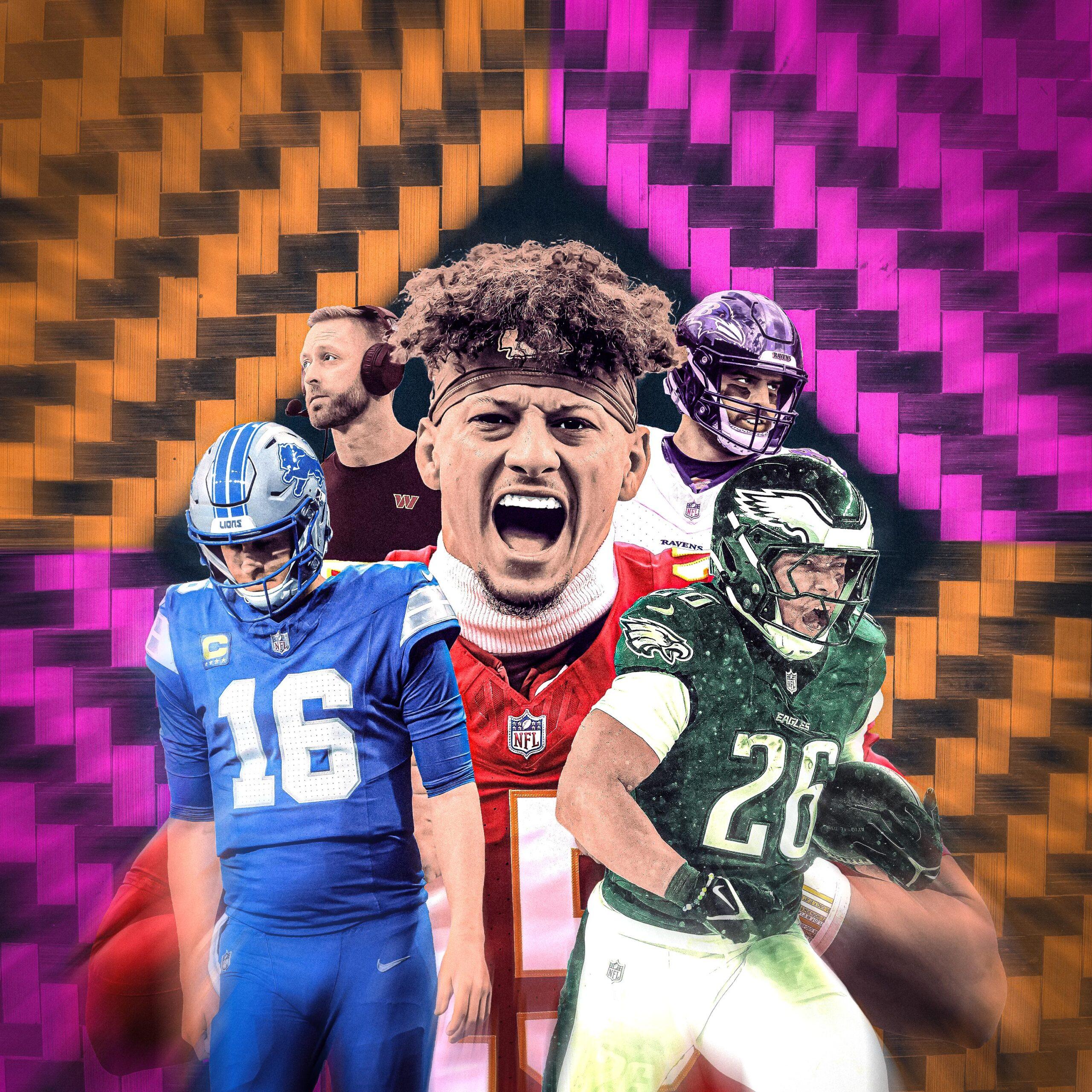
Every week this NFL season, we will break down the highs and lows—and everything in between—from the weekend that was in the NFL. This week, Lamar Jackson and the Ravens were bounced from the playoffs early (again), Patrick Mahomes and the Chiefs got the calls (again), and the Eagles didn’t need to pass to win (again). Welcome to Winners and Losers, playoff edition.
Winner: Josh Allen’s “Smart Guy”
In what is probably the biggest playoff win of Allen’s career to date, the MVP candidate wasn’t asked to do much. Allen threw for only 127 yards in Buffalo’s 27-25 win against Baltimore, and though it felt like he was unstoppable with the ball in his hands, he added only 20 yards on 10 run attempts. Bills fans won’t be telling their kids about the time Allen put up 147 yards against the Ravens is what I’m saying.
But the most important stat Allen produced in the Sunday night blockbuster was the big, fat zero in the turnover column, which fits the theme of his entire 2024 campaign. Allen has matured as a decision-maker, and thanks to a more balanced approach to the Bills offense, he hasn’t been asked to put on the Superman cape as often as he used to. That’s typically when Allen’s mistakes have popped up, as he acknowledged earlier this season when he said, “I got two guys [in me]: the smart guy and the reckless guy, and, sometimes, that reckless guy, you gotta let him out.” That may sound like a quote from an early-2000s Will Ferrell movie, but it’s an astute point. You do have to let the reckless guy out when the situation calls for it. Last season, the Bills needed that reckless version of Allen far more often. Thanks to coordinator Joe Brady’s new offense and the improved offensive line play this season, the “smart guy” has taken over. Allen fighting the urge to pitch the ball out of a stuffed run in crunch time late in the game against Baltimore may be the best illustration of that growth.
Allen’s pedestrian stat line against Baltimore wasn’t caused by inaccurate passes or bad decisions. He completed 73 percent of his attempts and didn’t put the ball in harm’s way all night. He was sacked only once (and lost only a yard on that play). He didn’t put up big numbers, but he kept Buffalo’s offense on schedule and ended the game with a QBR of 71.1, which paints a more accurate picture of his performance against the Ravens. Allen wasn’t exceptional, but the Bills didn’t need exceptional. With Baltimore beating itself, solid—and smart—was enough.
Allen didn’t have to let the reckless guy out to beat the Ravens, but we know that wild version of the Bills star is still in there, waiting to emerge at the appropriate time. That could be next week, with another duel with Patrick Mahomes standing between Allen and his first trip to the Super Bowl.
Loser: The Lamar Jackson Discourse
The losing quarterback in Bills-Ravens was destined to be the subject of some toxic discourse this week no matter how Sunday’s game played out, but Lamar Jackson sealed his fate with a pair of turnovers: an interception on a miscommunication with Rashod Bateman and a fumble while trying to salvage a busted run-pass option play. I guess I can’t get too upset with the take shows inevitably blaming Jackson for Baltimore’s season-ending 27-25 loss in Buffalo when the man himself did the same thing after the game. “We can’t have that shit,” a frustrated Jackson said. “And that’s why we lost the game. As you can see, we were moving the ball wonderfully—hold on to the fucking ball.”
That’s what makes the result so frustrating for Jackson. Despite his mistakes, the MVP favorite was still the best player on the field Sunday—at least by the numbers. He averaged 10.2 yards per pass attempt and completed 72 percent of his throws with an average depth of target over 10 yards in frigid, snowy conditions. He added another 39 yards on the ground. He averaged 0.12 expected points added per dropback and finished with an 85.8 QBR (out of 100). Even the turnovers couldn’t drag down his efficiency numbers. That’s how dominant he was outside of those two game-altering mistakes.
While Jackson got plenty of help from Baltimore’s running game, with Derrick Henry and Justice Hill combining to average 6.1 yards per rush on 22 carries, his pass catchers were not so helpful. Henry dropped a pass that would have gone for a big chunk play, while tight end Mark Andrews had a key drop in the middle of the field, lost a fumble after making a catch in the fourth quarter, and dropped what would have been the game-tying two-point conversion in the final seconds. Jackson was without his top receiver, with Zay Flowers on the inactive list. He lost Bateman, his WR2, to an injury late in the game. And with the Ravens playing from behind in the fourth quarter and needing to pass, Jackson delivered a clutch drive that was wasted by an untimely drop.
This should have been the performance that finally silenced Jackson’s few remaining doubters. He willed the Ravens back into the game with his arm and didn’t need a stacked group of pass catchers to lead the charge. But instead of remembering 2024 as the season when Jackson proved he belonged in the conversation for the league’s best quarterback, we’ll head into another offseason hearing questions about his playoff performance.
Winner: Philadelphia’s All-Weather Offense
Don’t tell the Eagles the NFL is a passing league. They’re one win away from the Super Bowl after running over the Rams 28-22 in a heavy snowstorm on Sunday. They have just 186 net passing yards in their two playoff wins this postseason. Philadelphia needed just 65 net passing yards to beat Los Angeles, thanks to the 285 yards Saquon Barkley, Jalen Hurts, and the running game produced on 34 attempts. The Eagles put up monster efficiency numbers, averaging 8.5 yards and 0.31 EPA per rushing attempt. Philly’s offensive line outclassed Los Angeles, and the Rams’ defensive front (literally) couldn’t get any traction against the run. The Eagles ballcarriers got the glory, but the offensive line was creating wide-open running lanes. Look at guard Mekhi Becton bat around a Rams linebacker like a cat playing with a toy.
On Hurts’s 44-yard touchdown run, which opened the scoring in the first half, left tackle Jordan Mailata had nobody to block downfield.
The snow was a limiting factor for both passing games, but I’m not sure Philadelphia needed to adjust its game plan at all on account of the weather. This is basically how the first matchup between these teams in late November played out. Barkley ran for 255 yards and two touchdowns in that game at SoFi Stadium, and there was no need for Philly to adjust for the rematch. Hurts took just 30 dropbacks on Sunday, but even that felt like too many. Every time offensive coordinator Kellen Moore called a pass play, it was a gift to the Rams defense.
Eventually, the Eagles will have to pass (and do it well) to win a game in these playoffs. Hurts will have to be better in the pocket for Philadelphia to finish this run with a Super Bowl title. But Sunday’s win did show how he’s able to raise the floor for the Eagles offense as a runner even when he’s not able to raise its ceiling as a passer. He had a 66 percent success rate on three scrambles and racked up 70 yards on three designed rushes. He took seven sacks that derailed the Eagles offense at times, and he was lucky to finish the game without a turnover after fumbling and throwing a pass into double coverage, but he also helped extend—or finish off—scoring drives with his legs. On a snowy day at Lincoln Financial Field, that helped make the difference.
We’ll need to review the all-22 footage from Sunday’s game to determine the issue holding back the Eagles’ passing game against the Rams. From the replays we got on the live NBC broadcast, it looks like there weren’t a lot of open receivers running downfield for Hurts to target. Philadelphia’s passing game is rather simple, which certainly is part of the problem, but a more complicated scheme wouldn’t necessarily fit Hurts’s skill set. And thanks to the pressure that the Eagles’ unstoppable run game and its star receiving duo put on opposing defenses, a simple passing scheme is all that’s required. The NFL’s final four is packed with teams whose offenses are built around star quarterbacks. The Eagles are the outlier. Instead, Philadelphia has designed its attack around the NFL’s best offensive line to the point that the passing game almost doesn’t matter.
Winner: Kliff Kingsbury
Maybe we all need a trip to Thailand. Kingsbury took a one-way trip to Thailand in January 2023, shortly after the Cardinals fired him as head coach. He returned to the U.S. later that year and worked as an offensive analyst at USC for one season under Lincoln Riley before Dan Quinn hired him to coordinate the Commanders offense last February. Kingsbury has said the trip to Southeast Asia helped him pause and reset his coaching career after taking an unusually short track from Texas Tech to his first NFL head coaching job. “Even when I got fired the first time, [I was the] first college coach to ever get fired and become an NFL head coach,” Kingsbury told The Washington Post in September. “So, I never even had to stop and think about it—like, I would’ve done this differently—or even examine why I’m doing it. So I needed [that] break, I think.”
Early this season, Kingsbury said he was “the best version” of himself, which sounded like a canned sound bite at the time. But since then, Kingsbury has backed it up throughout this remarkable Commanders run, and he may have completed the rehabilitation of his reputation by outcoaching Ben Johnson in Washington’s stunning 45-31 win over the Lions in Detroit. Jayden Daniels was as close to flawless as a rookie quarterback can get—he averaged 9.6 yards per attempt, threw two touchdown passes, ran for 51 yards, and didn’t take a sack—but Kingsbury had the entire offense flowing on Saturday night. Running backs Brian Robinson Jr. and Austin Ekeler combined for 124 yards on 21 carries and looked as if they were being shot out of a cannon into the second level of Detroit’s defense throughout the game. Washington’s receivers averaged 8.5 yards after the catch—though that number was inflated by Terry McLaurin’s 58-yard (Oops! All YAC) touchdown.
Kingsbury has been using those quick-hitting passes to keep defenses honest all season, and it’s helped prop up an offensive line that looks like a major liability on paper but has kept Daniels’s jersey clean for months. Daniels was hit only twice on 37 dropbacks against Detroit.
If we can just ignore the ill-fated fake quarterback sneak by Marcus Mariota, Kingsbury’s play calling shined on fourth down. Washington went three-of-four on fourth down, and Kingsbury provided his young quarterback with a defense-beating option on each conversion. He schemed tight end Zach Ertz to flash open over the middle to beat a Lions blitz on the first one:
Daniels ran to pick up the second one after a play fake that drew Detroit’s defense inside and left the perimeter wide open:
And on Washington’s third and final conversion of the night, Kingsbury set up a pick to free McLaurin against man coverage:
Washington’s offense has been doing this stuff all season. It converted on over 85 percent of its fourth-down attempts during the regular season, so the 75 percent night against Detroit was actually below standard.
Daniels’s ability to turn a pressured dropback into a positive gain with regularity has been the key factor in the Commanders’ fourth-down success, but the 2.0 update of Kingsbury’s offense has also played a role. The 45-year-old play caller hasn’t designed the most expansive dropback passing game, but he’s protected a handful of staple passing plays by running them out of different formations and using a faster tempo. There are plenty of sharp play callers who run core plays out of varied formations, but Washington has weaponized no-huddle to a unique degree. The Commanders didn’t huddle on 58 percent of their offensive snaps during the regular season. That led the league by 27 percentage points, according to TruMedia. With defenses scrambling to get proper personnel on the field and get lined up, there’s less time for defenders to figure out what the offense is trying to do.
After helping lead Washington to its first NFC title game since 1992 and overseeing Daniels’s historic rookie campaign, Kingsbury is a hot coaching candidate once again. His play calling seemingly had Tom Brady ready to offer him the Raiders’ head coaching gig during Saturday’s broadcast, and he’s reportedly emerged as a candidate for the open Cowboys job. Kingsbury has yet to take an interview during this hiring cycle—he’s waiting for Washington’s season to end, per a Pro Football Talk report—but his inbox could be flooded with requests after the show he put on in Detroit. The post-Thailand glow-up is real.
Loser: Jared Goff (and Traditional Pocket Passers Everywhere)
The Lions’ loss on Saturday night was caused by a number of factors—horrific injury luck throughout the season that finally caught up to them, Ben Johnson and Aaron Glenn leaning into their respective bits a bit too much, running into a buzz saw of a Washington offense, etc.—but, really, turnovers lost them this game. Detroit coughed it up five times, with quarterback Jared Goff accounting for four of them. The other turnover, Jameson Williams’s foolish interception on a trick play, is on Johnson, but outside of that one blunder, the Lions offensive coordinator lived up to the hype in what will likely be his final game calling plays in Detroit. The Lions averaged 0.48 EPA per play with a 60.6 percent success rate on their 63 non-turnover plays. They were ripping off explosive gains on the ground and through the air. Johnson’s play calling was as advertised.
Lions Offense Vs. Commanders Offense, Turnover Plays Excluded
Those five turnovers made the difference. That’s unfortunate for Goff, who did play well when he wasn’t giving the ball to the other team. That’s been the case for the Lions quarterback all season. He and Detroit had shown cracks during the regular season in the games when Goff was loose with the ball. Ultimately, Goff, the Lions’ highest-paid player, was the only one who could stop the offensive machine built by head coach Dan Campbell, general manager Brad Holmes, and Johnson. Goff had five games, including Saturday’s, in which he had at least two turnover-worthy plays this season, per Pro Football Focus. Detroit was outscored by seven points in those games. The Lions outscored their opponents by 215 points in the other 13 games.
With Johnson likely leaving for a head coaching job, the future of the Lions offense is murky. The offensive line should remain a strength, but it’s hard to keep a five-man unit intact, and Penei Sewell is the only starter on the line who’s younger than 28. Johnson has gotten a lot of the credit for elevating Goff’s play over the past three seasons, but it’s the offensive line that has brought the best out of the 30-year-old quarterback. Goff is the NFL’s best point-and-shoot passer. Give him a clean pocket and an open receiver, and he will deliver a dime. Detroit’s line, combined with the threat of the run game, has provided Goff with clean pockets routinely. Johnson and the talented pass catchers have taken care of the rest. Goff’s play is highly sensitive to the quality of his pass protection. Any slippage in pass protection or play calling could have a dramatic effect on his production.
Beyond the turnovers, Goff’s inability to create offense for his team in crunch time stood out when juxtaposed with Daniels’s playmaking on the other side. Washington’s pass rush eventually pressured Goff and forced him to move off his spot, and when it did, his game fell apart. He did make a Mahomes-like falling throw that Sam LaPorta one-handed for a touchdown, but that was the extent of Goff’s out-of-structure contributions. And even that play required a remarkable effort from Goff’s teammate, with LaPorta making one of the best catches of the year.
Quarterback mobility and second-reaction playmaking are no longer bonus features for a championship-level offense. Look around at the NFL’s final four, where Mahomes might be the least mobile of the remaining quarterbacks. It’s a requirement, and it’s a box in Goff’s game that always has been left unchecked.
But Goff wasn’t the only quarterback whose lack of mobility stood out over the weekend. Matthew Stafford still owns one of the most talented arms in the NFL, but the Rams quarterback looked old whenever Philadelphia’s pass rush was able to crash his pocket. The 36-year-old passer stood no chance when it was Philadelphia defensive tackle Jalen Carter applying the pressure.
Stafford can still make the big throws when pressured thanks to his rubbery throwing motion. He may not be able to extend dropbacks at this point in his career, but he can manage pressure by throwing around defenders and creating openings with no-look throws. He remains a dynamic passer, but it’s hard to consider him a dynamic quarterback in today’s league. Like Goff, Stafford needs a cushy offensive environment to play high-level football. That doesn’t mean quarterbacks like Goff or Stafford can’t lead their teams to championships. Stafford did it a few years back—though that was a few injuries ago—and we just saw Goff lead his team to a 15-2 regular season. There’s just a smaller margin for error with that offensive setup.
Winner: Chiefs Fatigue
If you weren’t tired of the Chiefs before their forgettable 23-14 win over the Texans on Saturday, you probably are now. The few lasting memories from the game will be of the egregiously bad roughing penalties called against Texans defenders for making negligible contact with Patrick Mahomes. I’m not sure which call was worse—Will Anderson Jr. being flagged for roughing the passer for this:
Or a Texans defender getting flagged after colliding with his own teammate when Mahomes ran into contact:
Then, right as we were all getting fired up about the refs coddling Mahomes with those two game-tilting decisions, the Chiefs quarterback poured a can of gasoline on the flames with a blatant display of flopping after taking a bump near the sideline. Mahomes wasn’t rewarded for the dive, thankfully, but this might have been the most frustrating play of the day for football fans outside of Kansas City.
The Chiefs have dominated the league for the better part of five years. The team’s list of off-the-field incidents is long and noteworthy. And the referees have given them some key calls in high-profile moments. Even the most ardent Kansas City fans must understand how exhausting it is for the rest of us to watch this.
Saturday’s game was a good illustration of why their act has gotten so tiring for the neutral observers who used to love watching this team play. The Chiefs’ product, from an entertainment standpoint, has gotten worse. The win over Houston was in many ways a rough watch. The teams played an even game from a statistical standpoint. Both offenses had good moments, but neither was able to find much rhythm. Houston’s disastrous special teams, field position, and penalties ultimately decided the outcome—not the spectacular play of Kansas City. If the Chiefs and their fans don’t want to hear the rest of us complain about the refs, they should give us something else to talk about.
I suppose we should talk about the other things that did happen in the game now. There were a few important developments that could decide how far Kansas City gets this season, including the re-emergence of Travis Kelce. The 35-year-old tight end beat Houston for 117 yards on seven catches, including his first play of 20 or more yards of YAC this season.
Kelce is coming off his worst regular season in a while, so turning back the clock against Houston was an encouraging, and maybe vital, sign for the Chiefs offense. But there was little else to get excited about after the win over Houston. The offensive line struggled to contain a great Texans pass rush, the running game was useless for the most part, and Xavier Worthy was the only Chiefs wide receiver who registered any yards. Kansas City’s defense did sack C.J. Stroud eight times, but couldn’t slow down a bad Houston ground attack, which will be a concern with Buffalo coming to Kansas City next.
Still, the Chiefs did what they do better than any other team in the league: They survived and advanced to another conference championship game. And while Houston may have been the worst team left in the playoff field in the divisional round, and Kansas City’s victory didn’t win them any new fans, this was a bad matchup for the two-time defending champions and they made it through. Maybe we’ll get them next week.



